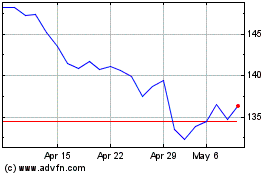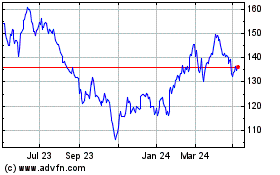Apple to Fall Short of Projected Revenue Due to Coronavirus
February 17 2020 - 6:04PM
Dow Jones News
By Tripp Mickle
Apple Inc. became the first major U.S. company to say it won't
meet its revenue projections for the current quarter due to the
coronavirus outbreak, which it said had limited iPhone production
for world-wide sales and curtailed demand for its products in
China.
Apple had last month projected record revenue for the current
quarter of between $63 billion and $67 billion, which it said was a
wider than normal range due to the virus. The technology giant on
Monday didn't provide an updated sales estimate, saying that the
situation in China is evolving. It said it would provide more
information when it holds its earnings call in April.
The tech giant's announcement is the most prominent example yet
of the broad ripple effects of the coronavirus on global business
and markets as the outbreak continues to spread, hitting smartphone
sales and commodity prices and delaying production across
industries.
The difficulties are extending into supply chains around the
world. Volkswagen AG said Monday it would postpone production
restarts at some Chinese plants for another week. Fiat Chrysler
Automobiles NV last week said it temporarily halted production in
Serbia because it could not get parts from China, which continues
to deal with manufacturing delays as it seeks to contain the spread
of the virus.
Oil prices have fallen 11% in recent weeks in anticipation of
reduced demand from the world's most populous country, and the
outbreak has also weighed on iron-ore prices. A dearth of Chinese
tourists in the U.S. has also hit a number of luxury brands such as
Estée Lauder Cos. and Capri Holdings Ltd. which owns the Versace
and Jimmy Choo brands.
On Monday, hundreds of Americans who had been passengers on a
quarantined Japanese cruise ship arrived in the U.S, including 14
people who tested positive for the coronavirus. The World Health
Organization reported 71,000 cases world-wide, with over 1,770
deaths. Only three deaths and 794 cases have occurred outside of
China, according to the WHO, with the majority of those cases being
on the cruise ship.
Apple's announcement is the second time in two years that the
company has reset revenue projections because of problems in China.
A year ago, it slashed guidance for the first time in more than 15
years because of weak iPhone demand in China and elsewhere in the
world.
The back-to-back revisions underscore how China, once one of
Apple's strengths, has emerged as one of its greatest challenges.
The company has relied on China's manufacturing sector -- with its
low-cost and abundant workforce -- to assemble the vast majority of
the products it sells worldwide. It also has become one of the most
successful U.S. brands in China, where it had $44 billion in sales
last year, nearly a fifth of the company's total revenue.
The twin dependency on China's manufacturing and consumer
sectors made Apple vulnerable as the new coronavirus paralyzed the
country. The Chinese government moved swiftly to contain the virus
by limiting movement across the country and locking down Wuhan, the
city at the epicenter of the outbreak. Concerns over the virus led
to the closure of stores across the country and caused a 10-day
delay in the resumption of manufacturing following the Lunar New
Year holiday.
Apple said its contract manufacturers were ramping up production
"more slowly than we had anticipated." As a result, it said that
there would be iPhone supply shortages that temporarily affect
world-wide sales.
It also said the closure of its own stores and many partner
stores across China had affected sales of its products. Many stores
have been operating at reduced hours and had very low customer
traffic, the company said. It added that it is gradually reopening
its stores and will continue to do so as soon as possible.
The company said that outside of China demand for its products
and services had been strong and in line with expectations.
The announcement Monday represented a swift reversal in Apple's
expectations for the quarter. In late January, Chief Executive Tim
Cook downplayed the risk of the virus, saying the company was
developing plans to make up for any lost production from Wuhan,
where two of Apple's top 200 suppliers are based. He said Apple
expected factories elsewhere to reopen after the 10-day delay.
"We factored our best thinking in the guidance that we provided
you," Mr. Cook said in January.
Write to Tripp Mickle at Tripp.Mickle@wsj.com
(END) Dow Jones Newswires
February 17, 2020 17:49 ET (22:49 GMT)
Copyright (c) 2020 Dow Jones & Company, Inc.
Volkswagen (TG:VOW)
Historical Stock Chart
From Mar 2024 to Apr 2024

Volkswagen (TG:VOW)
Historical Stock Chart
From Apr 2023 to Apr 2024
